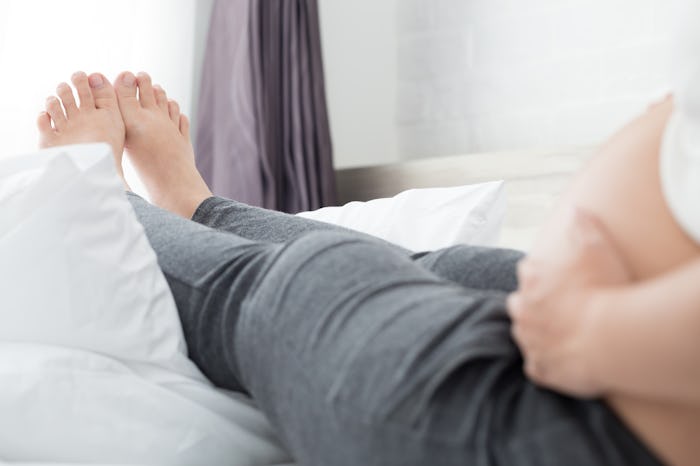Life

What Every Pregnant Woman Needs To Know When Her Hands & Ankles Start Swelling
Among the many "indignities" of pregnancy — from skin discoloration, to cystic acne, to not being able to fit into your clothes — comes one more whammy you may not have expected: the swelling. When you look down and discover you're the not-so-proud owner of cankles and a pair of Oompa-Loompa hands, you might feel like never leaving the house again. So why do your ankles and hands swell when you're pregnant? And perhaps more importantly, is there a way to stop that from happening? Thankfully, there some some answers and possible remedies at your disposal.
The first thing you should know is that swelling of the hands and ankles during pregnancy is a perfectly normal thing. As noted in a study published in the National Library of Medicine National Institute of Health's (NCBI) website, 8 out of 10 women demonstrate a clinical level of swelling (also known as "edema") at some point during pregnancy. This swelling happens for a few reasons, the most common of which is fluid retention during pregnancy.
The American Pregnancy Association (APA) explains further, saying the body produces approximately 50 percent more blood and body fluids to meet the needs of your developing baby when you're pregnant. This fluid softens the body and helps it expand as your baby grows, and also helps prepare your joints and tissues for delivery. Where is all that additional blood and fluid supposed to go? According to the APA, fluid retention can usually be seen anywhere from the hands, to the face, to the legs, to the ankles, to the feet (and is usually experienced around the 20 week mark of pregnancy).
Another factor that can lead to swelling during pregnancy is your growing uterus. The American Congress of Obstetricians and Gynecologists' (ACOG) website states that the increased weight and pressure of your uterus during pregnancy can decrease blood flow from your lower body back to your heart. This can cause fluid to accumulate in your calves and feet and sometimes can put increased pressure on your leg veins. (When the veins are affected, that's where those dreaded varicose veins that some people experience during pregnancy come from.)
Hormonal changes are another reason you might be feeling like the Stay Puft Marshmallow Man from the movie Ghostbusters. As the site Merck Manuals states: "Fluid accumulates during pregnancy because the adrenal glands produce more of the hormones that make the body retain fluids (aldosterone and cortisol)."
According to the APA, swelling doesn't happen to all expecting moms, but if it does happen, it is likely to occur around the fifth-month mark and can get worse up through the third trimester. It goes away after Baby is born, though, so at least you have that going for you.
One thing to definitely be on the lookout for with regards to swelling, is sudden swelling that is painful, especially if it is in one leg only. The Mayo Clinic's website warns that sudden and painful swelling could indicate a blood clot or higher-than-normal blood pressure (which could be a sign of preeclampsia). Either symptom would mean it is time to see a doctor, ASAP.
So what can a girl do to stave off the puff and swell of pregnancy? There are a couple tools you can put in your toolbox. For starters, as the Mayo Clinic says a good thing to practice is to avoid standing for long periods of time. Another? Always sleep on your left side to take pressure off the vein that returns blood back to your body. Of course, exercise is always a great way to keep blood flowing throughout your body. And, as the Mayo Clinic points out, your doctor may recommend a lovely pair of compression stockings (always fun!). As the APA advises, it is probably best to avoid high-sodium foods during your third trimester. And probably the number one way to reduce fluid retention and swelling is the one that seems the most counterintuitive, which is to drink more water!
The really good news is that you will be able to fit into your shoes one day. The swelling will all go away after you delivery your baby. As the Mayo Clinic reassuringly states: "After the baby is born, your body will begin to get rid of the excess fluid it needed during pregnancy. It may take a week or so and the swelling may seem to get worse before it gets better, but you're sure to see your ankles and calves again." That's good news for your favorite pair of Instagram-worthy kicks.
Watch Romper's new video series, Romper's Doula Diaries:
Check out the entire Romper's Doula Diaries series and other videos on Facebook and the Bustle app across Apple TV, Roku, and Amazon Fire TV.